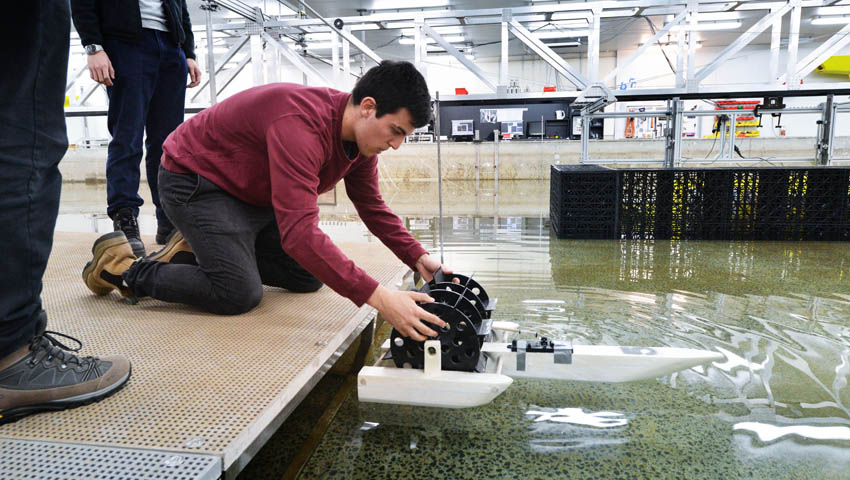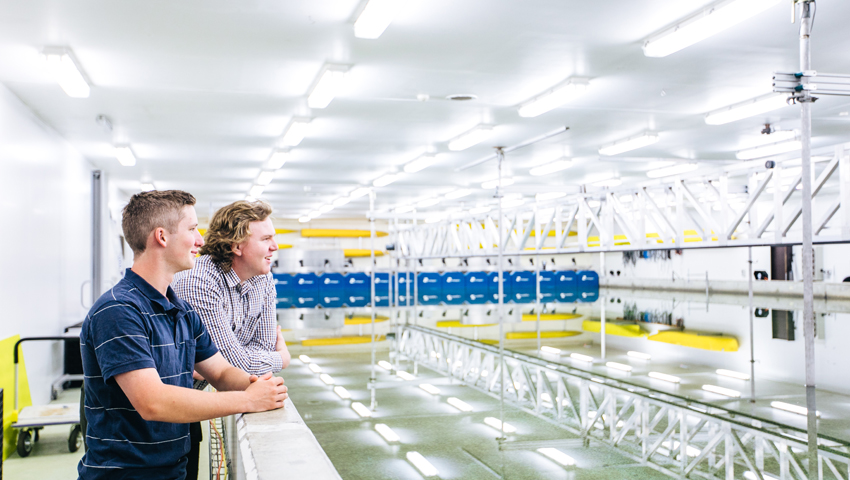Promoted by Defence Tasmania
With renewed support from the Commonwealth Government, the Australian Maritime College is redoubling its efforts to enhance the nation’s sovereign shipbuilding capability.
For over four decades, the Australian Maritime College (AMC), a strategic partner of the Naval Shipbuilding College (NSC), has fostered collaboration between industry, government and academia in support of Defence’s naval shipbuilding programs.
The AMC, based out of the University of Tasmania’s (UTAS) Newnham campus, delivers education and training across a range of civilian and defence disciplines, including:
- Maritime engineering and hydrodynamics;
- Maritime business and international logistics;
- Ocean seafaring; and
- Coastal seafaring and VET courses.
The AMC’s remit has expanded over the past year, with the federal government investing $30 million in the development of the Defence and Maritime Innovation and Design Precinct, as part of a new push to bolster sovereign shipbuilding capability.
This investment is expected to accelerate the development of new cutting-edge research, innovation and training concepts, aimed at delivering the expertise and workforce required to realise Australia’s shipbuilding ambitions.
The new initiative represents a vote of confidence in the AMC’s existing activities, which include delivering a swathe of undergraduate and postgraduate courses via cross-institutional ‘2+2’ arrangements with institutional partners like South Australia’s Flinders University and Western Australia’s Edith Cowan University.
According to principal of the AMC, former Deputy Chief of Navy, Rear Admiral Michael van Balen AO, such arrangements underpin the AMC’s work to “build the right skilled workforce for the future”.
RADM van Balen has attributed the success of the programs to the extensive consultation work undertaken by the AMC to inform course development.
“Our degrees are very much influenced by industry engagement. We have an industry advisory committee that meets and has oversight over our program and contributes to their direction,” he noted.
“That enables us to therefore engage with the broader industry, in the knowledge of what it is that they seek, and tailor courses accordingly.”
RADM van Balen added that the AMC’s consultative approach has also enabled it to withstand recent challenges, including the COVID-19 pandemic, which impacted course enlistment numbers due to travel restrictions.
He said that with the support of the NSC, the AMC was able to attract more local interest.
“The number of international students has obviously declined over the last 12 months or more, given the implications of COVID [but] we've had a significant increase in domestic students,” he said.
“In fact, this year, we have more domestic students here at AMC than we had last year or the year before.
“That’s partially a result of the service that the Naval Shipbuilding College provides, where they, take queries from prospective students, then field them to their respective academic institutions to ensure the individual has the opportunity to understand what courses are available to them.”

Inspiring the next generation
Another key component of the AMC’s work has been to promote STEM education (science, technology, engineering, and mathematics) among secondary school students.
The AMC has embarked on this mission by rolling out a suite of engaging courses, which focus on demonstrating the real-world applications of STEM education in the maritime space.
Among the outreach initiatives offered to school students is the ‘Why Study Maths?’ program, which showcases how mathematics can be applied to maritime engineering concepts, providing students with an insight into potential career pathways.
The program, tailored to students from grades 9-12, is delivered both face-to-face and virtually.
But perhaps the biggest initiative supported by AMC in 2021 is the SUBS in Schools program, delivered in conjunction with Re-Engineering Foundation Australia, NSC, and the Commonwealth government.
The program focuses on engaging student interest in submersible vehicle technology and submarines, drawing on the fundamentals of project-based learning.
Participating students learn about complex engineering systems by building operational one-metre-long Remotely Operated Vehicles (ROVs) in collaboration with industry stakeholders.
The program has evolved into a nation-wide challenge, with schools from across the country competing for the top prize.
AMC will host approximately 350 students in this year’s SUBS in Schools state finals, scheduled to take place on 2-3 December.
Reflecting on the AMC’s suite of programs, RADM van Balen noted that such initiatives would not only advance Australia’s naval shipbuilding ambitions, but would benefit the community at large.
“Australia needs people skilled in STEM specialisations across the board,” he noted.
“What we have to do as a nation to succeed, is to develop these specialist skill sets by getting our youngsters interested in the respective areas of expertise.
“The best way to do that is by giving them the opportunity to experience it firsthand. Once their interest has peaked, we can then show them the pathways that are available to help them achieve their goals.”
 Login
Login






